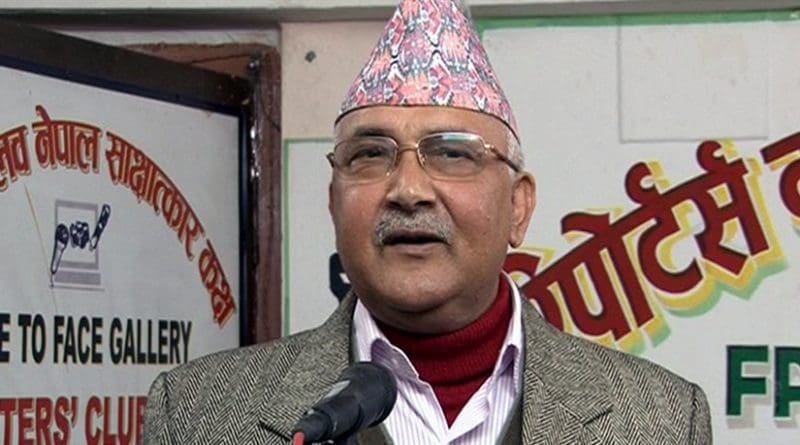Nepal: PM Oli Under Siege – Analysis
By SAAG
By Dr. S.Chandrasekharan
Nepal’s PM Oli who had hopes to continue as the Prime Minister till the next General election in Jan or Feb 2018 is facing many problems and it is not certain whether he would continue for long. His own party leadership as well as his coalition partners are against him and he is being accused of having failed to resolve all the outstanding problems.
The irony is that Oli inherited most of the problems from the previous government. Issues like the constitutional impasse and the Madhesi agitation, delayed reconstruction and rehabilitation work and slow movement in transitional justice are not of his making. Yet he could have shown more sincerity, friendliness and a feeling of urgency in getting the issues resolved.
Governance has come to a standstill. Over 40 bills including some important ones like local self-government act and contempt of court bill are pending in Parliament with the concerned ministers or house committees showing no initiative to expedite the bills.
With worsening economy and a bloated budget more people appear to be running away from Nepal which by one count is said to be 1500 a day. In spite of a poor financial situation, the government employees have been given a hefty increase in their salaries recently thus adding to the prevailing inflationary trends!
Gentleman’s Agreement
It is said that when PM Oli was about to be toppled by the Nepali Congress with the help of the Maoists and a part of the Madhesi group for a “unity government” under Maoist Chief Dahal, he had no choice but to surrender to the Maoists. A nine-point agreement was thus signed between the two parties- the UML and the CPN (Maoist).
It was also widely reported that Oli had also agreed to step down soon after the budget is passed and let the Maoist Chief Dahal to take over and form the so called “unity government.”
The budget was presented on 29th of May and so Dahal was waiting for a call from Oli to take over as per their “Gentleman’s Agreement.” Meanwhile Dahal had also strengthened himself by getting most of the splinter Maoist parties under his chairmanship with a new name as Communist Party of Nepal-Maoist Center.
Oli not only refused to step down but denied of having entered into any such agreement. Dahal on the other hand claimed that the deal was indeed reached.
In my view there is nothing like Gentleman’ agreement in politics. Even if Oli had agreed orally directly or indirectly to step down, he does not have to do so.
Dahal clarified that he was not really interested in becoming Prime Minister and that his only aim was to form a national government to ensure that the peace process is taken to its logical end.
It is good that Dahal who is a master in shifting goal posts was himself given a dose of his medicine and no one would believe that he was not interested in becoming the prime minister.
It is not clear how the Nepali Congress would benefit by getting Dahal in place of Oli as Prime Minister. They should not forget that most of the problems inherited by Oli was from the days when the Nepali Congress was in power. They were the ones who excluded and marginalised both the Madhesi groups and the Janajathis in rushing through the new constitution. K.P.Situala and company should share the blame for the Madhesi agitation where innocent lives were lost unnecessarily.
If the Madhesi groups think that by combining with the Nepali Congress and the Maoists they could topple Oli’s government to achieve their objectives, they are sadly mistaken!
The Maoists have their own agenda and so far, the Nepali Congress has not shown any sympathy for the Madhesi cause either.
The Madhesi Agitation
The Kathmandu centric agitation by the Federal Alliance- (a combination of Madhesi and Janajathi groups) is continuing in a low key. Except on the first day when a government vehicle was vandalised and police action elsewhere, the agitation has generally been peaceful.
It was surprising that the alliance was able to muster more than a thousand volunteers a day and it looks that the agitation may continue for some time until something definite is known about the continuance of Oli’s government.
On 20th of May, the meeting of the Council of Ministers urged the agitating parties to come for talks with the promise that the government would show “maximum flexibility.”
Deputy Prime Minister Kamal Thapa had also individually written to all the parties on 9th of May to come for talks at a mutually agreed date and time.
The agitating parties rejected the offer of meeting and said that would attend only if some of their ‘pre requisite’ conditions are met and a favorable environment is created.
The problem is that both the Prime Minister as well as the leaders of other ruling parties do not appear to be sincere. There is a huge trust deficit between the two and there appears to be immediate chance of one or other giving way for a mutually favourable agreement.
Luckily for India- “India bashing” has diminished- may be because Oli is too busy with his own problems- created by himself, his own party and other coalition partners.

